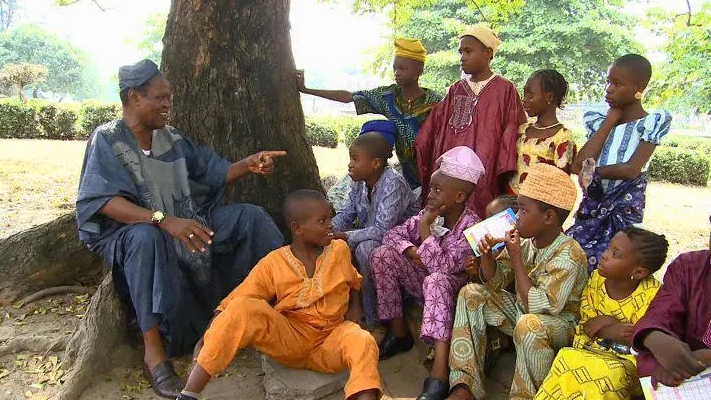
support@yorubalibrary.com
+2348073529208, 07038599574

Storytelling holds a special place in Yoruba culture, serving as a medium for transmitting history, morals, and values from one generation to the next. This article explores the significance of storytelling in Yoruba society, the types of stories told, and the impact of these narratives on the community.
The Importance of Storytelling
In Yoruba culture, storytelling is much more than entertainment; it is a vital cultural practice that preserves the collective memory and wisdom of the people. Through stories, the Yoruba pass down traditions, social norms, and lessons that shape individual and communal identities.
Oral Tradition
The Yoruba people have a rich oral tradition where storytelling plays a central role. Elders are the custodians of these stories, ensuring that the history and knowledge of the community are preserved and conveyed accurately.
Education and Moral Instruction
Storytelling is a powerful tool for education and moral instruction. Yoruba stories often contain moral lessons that teach values such as honesty, bravery, and respect. These narratives help young people understand the consequences of actions and the importance of ethical behavior.
Types of Yoruba Stories
Yoruba storytelling encompasses various types of narratives, each serving different purposes and reflecting different aspects of Yoruba life and beliefs.
Folktales
Folktales are a significant part of Yoruba storytelling, featuring characters like animals, humans, and supernatural beings. These tales often carry moral lessons and are used to teach children about right and wrong.
Example: The Tortoise and the Birds
One well-known Yoruba folktale is the story of Ijapa (the tortoise) and the birds. In this tale, the cunning tortoise convinces the birds to lend him feathers so he can join them at a feast in the sky. He adopts the name "All of You" to trick the birds into giving him all the food. When the birds realize they have been deceived, they take back their feathers, leaving the tortoise to fall from the sky and crack his shell. This story teaches the lesson that deceit and greed have consequences.
Myths and Legends
Yoruba myths and legends explain the origins of the world, the gods, and natural phenomena. These stories are deeply rooted in Yoruba spirituality and cosmology.
Example: The Creation Myth
According to Yoruba mythology, the world was created by Olodumare (the Supreme Being) through the deity Obatala, who formed the earth and its inhabitants. These myths provide a sense of identity and place within the universe, linking the Yoruba people to their divine origins.
Historical Narratives
Historical narratives recount the deeds of ancestors, kings, and heroes. These stories preserve the history of the Yoruba people, including significant events, battles, and migrations.
Example: The Story of Oduduwa
Oduduwa is a legendary figure in Yoruba history, considered the progenitor of the Yoruba people. Stories of Oduduwa recount how he descended from the heavens to establish the city of Ile-Ife, laying the foundation for Yoruba civilization. These narratives instill pride and a sense of belonging among the Yoruba.
The Role of Storytellers
Storytellers, or griots, play a crucial role in Yoruba culture. They are revered for their knowledge and skill in narrating stories that entertain, educate, and inspire.
Skills and Techniques
Yoruba storytellers employ various techniques to captivate their audience, including dramatic expressions, songs, and proverbs. Their performances are often interactive, encouraging audience participation to enhance the storytelling experience.
Preservation of Culture
By passing down stories orally, griots ensure that Yoruba traditions and values are preserved. They adapt their stories to remain relevant to contemporary audiences while maintaining the core messages and lessons.
The Impact of Storytelling on Community
Storytelling has a profound impact on the Yoruba community, fostering social cohesion and continuity.
Building Social Bonds
Storytelling sessions are communal events that bring people together, strengthening social bonds and creating a sense of unity. These gatherings allow members of the community to share experiences and reinforce their collective identity.
Cultural Continuity
Through storytelling, the Yoruba people maintain a continuous link to their past. Stories serve as a bridge between generations, ensuring that the wisdom and experiences of ancestors are not forgotten.
Empowerment and Identity
Storytelling empowers individuals by connecting them to their cultural heritage. It instills pride in their identity and inspires them to uphold the values and traditions of their ancestors.
Conclusion
Storytelling is an integral part of Yoruba culture, serving as a medium for preserving history, imparting moral lessons, and fostering community bonds. The diverse types of stories—ranging from folktales to historical narratives—reflect the richness of Yoruba heritage. By continuing the tradition of storytelling, the Yoruba people ensure that their culture remains vibrant and relevant for future generations.

Learn about the Yoruba concept of Ìwà Pẹ̀lẹ́ (good…

Learn special praises for Divine Being and Creator…